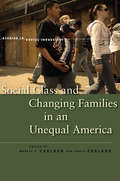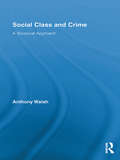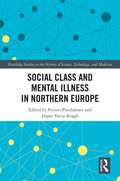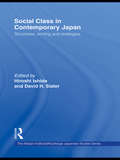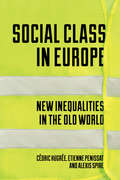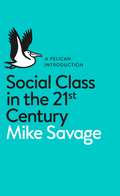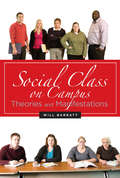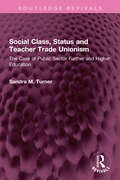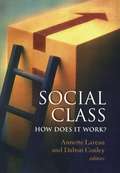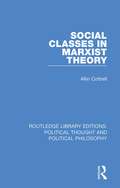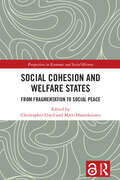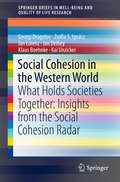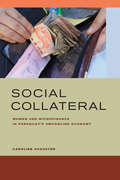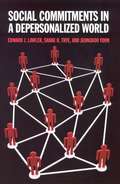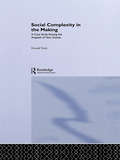- Table View
- List View
Social Class and Changing Families in an Unequal America
by Marcia J. Carlson Paula EnglandAmerican families are far more diverse and complex today than they were 50 years ago. As ideas about marriage, divorce, and remarriage have changed, so too have our understandings about cohabitation, childbearing, parenting, and the transition to adulthood. Americans of all socioeconomic backgrounds have witnessed changes in the nature of family life, but as this book reveals, these changes play out in very different ways for the wealthy or well off than they do for the poor. Social Class and Changing Families in an Unequal Americaoffers an up-to-the-moment assessment of the condition of the family in an era of growing inequality. Highlighting unique aspects of family behavior, it reveals the degree to which families' varying experiences are shaped by social class. This book offers a much needed assessment of contemporary family life amid the turbulent economic changes in the United States.
Social Class and Crime: A Biosocial Approach (Routledge Advances in Criminology)
by Anthony WalshSocial class has been at the forefront of sociological theories of crime from their inception. It is explicitly central to some theories such as anomie/strain and conflict, and nips aggressively at the periphery of others such as social control theory. Yet none of these theories engage in a systematic exploration of what social class is, how individuals come to be placed in one rung of the class ladder rather than another, or the precise nature of the class-crime relationship. This book avers that the same factors that help to determine a person’s class level also help to determine that person’s risk for committing criminal acts. Social class is a modern outcome of primordial status-striving and requires explanation using the modern tools of genetics, neurobiology, and evolutionary biology, and this is what this book does. Many aspects of criminal behavior can be understood by examining the shared factors that lead to the success or failure in the workplace and to pro- or antisocial activities. A biosocial approach requires reducing sociology’s “master variable” to a lower level analysis to examine its constituent parts, which is resisted by many criminologists as highly controversial. However, this book makes plain that the more we know about the nature side of behavior the more important we find the nurture side to be. It makes clear how the class/crime relationship and criminology in general, can benefit from the biosocial perspective; a perspective that many criminological luminaries expect to be the dominant paradigm for the twenty first century.
Social Class and Educational Inequality: The Impact of Parents and Schools
by Iram Siraj Aziza MayoSocial class is often seen as an intractable barrier to success, yet a number of children from disadvantaged backgrounds still manage to show resilience and succeed against the odds. This book presents the findings from fifty Child and Family Case Studies (CFCS) conducted with 13–16 year olds. The authors look specifically at the roles that people and experiences - at home, in schools and in the wider community - have played in the learning life-courses of these children; how these factors have affected their achievement; and explanations and meanings given by respondents to the unique characteristics, experiences and events in their lives. Featuring the voices of real parents and children, and backed up by a decade of quantitative data, this is a compelling record that will help readers to understand the complex nature of social disadvantage and the interplay between risk and protective factors in homes and schools that can make for a transformational educational experience.
Social Class and Mental Illness in Northern Europe (Routledge Studies in the History of Science, Technology and Medicine)
by Petteri Pietikäinen Jesper Vaczy KraghThis book examines the relationship between social class and mental illness in Northern Europe during the 20th century. Contributors explore the socioeconomic status of mental patients, the possible influence of social class on the diagnoses and treatment they received in psychiatric institutions, and how social class affected the ways in which the problems of minorities, children and various ‘deviants’ and ‘misfits’ were evaluated and managed by mental health professionals. The basic message of the book is that, even in developing welfare states founded on social equality, social class has been a significant factor that has affected mental health in many different ways – and still does.
Social Class and Transnational Human Capital: How Middle and Upper Class Parents Prepare Their Children for Globalization (Routledge Advances in Sociology)
by Jürgen Gerhards Sören Carlson Hans SilkeDue to globalization processes, foreign language skills, knowledge about other countries and intercultural competences have increasingly become important for societies and people’s social positions. Previous research on social inequality, however, has dominantly focused on the reproduction of class structures within the boundaries of a particular nation-state without considering the importance of these specific skills and competences. Within Social Class and Transnational Human Capital authors Gerhards, Hans and Carlson refer to these skills as ‘transnational human capital’ and ask to what extent access to this increasingly sought-after resource depends on social class. Based on Pierre Bourdieu’s theory of class, they investigate this question via both quantitative and qualitative empirical analyses. In doing so the authors focus, among other examples, on the so-called school year abroad, i.e. students spending up to a year abroad while attending school – a practice which is rather popular in Germany, but also quite common in many other countries. Thus, this insightful volume explores how inequalities in the acquisition of transnational human capital and new forms of social distinction are produced within families, depending on their class position and the educational strategies parents pursue when trying to prepare their children for a globalizing world. An enlightening title, this book will appeal to undergraduate and postgraduate students, as well as postdoctoral researchers interested in fields such as sociology, social inequality research, globalization studies and educational studies.
Social Class in Contemporary Japan: Structures, Sorting and Strategies (Nissan Institute/Routledge Japanese Studies)
by Hiroshi Ishida David H. SlaterPost-war Japan was often held up as the model example of the first mature industrial societies outside the Western economy, and the first examples of "middle-mass" society. Today, and since the bursting of the economic bubble in the 1990’s, the promises of Japan, Inc., seem far away. Social Class in Contemporary Japan is the first single volume that traces the dynamics of social structure, institutional socialization and class culture through this turbulent period, all the way into the contemporary neoliberal moment. In an innovative multi-disciplinary approach that include top scholars working on quantitative class structure, policy development, and ethnographic analysis, this volume highlights the centrality of class formation to our understanding of the many levels of Japanese society. The chapters each address a different aspect of class formation and transformation which stand on their own. Taken together, they document the advantages of putting Japan in the broad comparative framework of class analysis and the enduring importance of social class to the analysis of industrial and post-industrial societies. Written by a team of contributors from Japan, the US and Europe this book will be invaluable to students and scholars of Japanese society and culture, as well as those interested in cultural anthropology and social class alike.
Social Class in Europe: New Inequalities in the Old World
by Etienne Penissat Alexis Spire Cedric HugreeMapping the class divisions that run throughout EuropeOver the last ten years - especially with the 'no' votes in the French and Dutch referendums in 2010, and the victory for Brexit in 2016 - the issue of Europe has been placed at the centre of major political conflicts. Each of these crises has revealed profound splits in society, which are represented in terms of an opposition between those countries on the losing and those on the winning sides of globalisation. Inequalities beyond those between nations are critically absent from the debate. Based on major European statistical surveys, the new research in this work presents a map of social classes inspired by Pierre Bourdieu's sociology. It reveals the common features of the working class, the intermediate class and the privileged class in Europe. National features combine with social inequalities, through an account of the social distance between specific groups in nations in the North and in the countries of the South and East of Europe. The book ends with a reflection on the conditions that would be required for the emergence of a Europe-wide social movement.
Social Class in Later Life: Power, Identity and Lifestyle
by Marvin Formosa and Paul HiggsSocial class in later life: Power, identity and lifestyle provides the most up-to-date collection of new and emerging research relevant to contemporary debates on the relationship between class, culture, and later life.
Social Class in the 21st Century (Pelican Books)
by Mike SavageA fresh take on social class from the experts behind the BBC's 'Great British Class Survey'.Why does social class matter more than ever in Britain today?How has the meaning of class changed?What does this mean for social mobility and inequality?In this book Mike Savage and the team of sociologists responsible for the Great British Class Survey look beyond the labels to explore how and why our society is changing and what this means for the people who find themselves in the margins as well as in the centre.Their new conceptualization of class is based on the distribution of three kinds of capital - economic (inequalities in income and wealth), social (the different kinds of people we know) and cultural (the ways in which our leisure and cultural preferences are exclusive) - and provides incontrovertible evidence that class is as powerful and relevant today as it's ever been.
Social Class on Campus: Theories and Manifestations
by Will BarrattThis is at once a playful text with a serious purpose: to provide the reader with the theoretical lenses to analyze the dynamics of social class. It will appeal to students, and indeed anyone interested in how class mediates relationships in higher education, both because of its engaging tone, and because it uses the college campus as a microcosm for observing and analyzing the concept of class – and does so in a way that will prompt the reader to reflect on her or his location in the continuum of class, and understand how every member of the campus community helps co-construct social class.Will Barratt starts from the premise that there is more than one way to study any idea; and that the more tools we use to examine a concept, the more fully we understand it in all its complexity and ambiguity. To illustrate salient features of class on campus, he introduces five fictional European-American women – Whitney Page, Louise, Misty, Ursula, and Eleanor – and also includes the real stories of students who represent a diversity of backgrounds.Social class is often neglected or ignored as an important issue in the lives of students. The book provides the reader with a language for analyzing class, with theories of class that go beyond standard economic and sociological models, and examples of the manifestation of class – all toward the end of helping the reader have more agency in working with this difficult and challenging concept. This book is suitable for students going to college for the first time, for courses exploring multicultural issues in contemporary society, and for anyone professionally involved with students. Each chapter includes a suggested experience and reflection questions to prompt readers to explore their thinking and feeling about class, as well as class discussion questions.
Social Class, Language and Communication (Primary Socialization, Language and Education)
by D. Henderson W. BrandisOriginally published in 1970, Social Class, Language and Communication explores the different effects of parental social class, the ability and sex of the child and a measure of the mother’s reported communication to her child, upon aspects of five-year-old children’s speech. The study shows the relationship between a measure of linguistic flexibility in children and their family’s social class position and includes the construction and application of an index of maternal communication and control. Today it can be read in its historical context.
Social Class, Status and Teacher Trade Unionism: The Case of Public Sector Further and Higher Education (Routledge Revivals)
by Sandra M. TurnerFirst published in 1988, Social Class, Status and Teacher Trade Unionism examines some of the causes underlying the growing resentment of public sector professionals, focusing on the teachers in the polytechnics and colleges of further and higher education and on their union, once the Association of Teachers in Technical Institutions. It looks in depth at the relationship between professional commitment and trade union activism, and at the limits employee status, within a bureaucratic control structure, can impose on professional self-management and control. The book provides both an important social history of the teachers and teaching in this sector and an incisive analysis of the nature and development of ‘professional trade unions’. This book will be of interest to students of education, sociology and history.
Social Class: How Does It Work?
by Dalton Conley Annette LareauClass differences permeate the neighborhoods, classrooms, and workplaces where we lead our daily lives. But little is known about how class really works, and its importance is often downplayed or denied. In this important new volume, leading sociologists systematically examine how social class operates in the United States today. Social Class argues against the view that we are becoming a classless society. The authors show instead the decisive ways social class matters—from how long people live, to how they raise their children, to how they vote. The distinguished contributors to Social Class examine how class works in a variety of domains including politics, health, education, gender, and the family. Michael Hout shows that class membership remains an integral part of identity in the U.S.—in two large national surveys, over 97 percent of Americans, when prompted, identify themselves with a particular class. Dalton Conley identifies an intangible but crucial source of class difference that he calls the “opportunity horizon”—children form aspirations based on what they have seen is possible. The best predictor of earning a college degree isn’t race, income, or even parental occupation—it is, rather, the level of education that one’s parents achieved. Annette Lareau and Elliot Weininger find that parental involvement in the college application process, which significantly contributes to student success, is overwhelmingly a middle-class phenomenon. David Grusky and Kim Weeden introduce a new model for measuring inequality that allows researchers to assess not just the extent of inequality, but also whether it is taking on a more polarized, class-based form. John Goldthorpe and Michelle Jackson examine the academic careers of students in three social classes and find that poorly performing students from high-status families do much better in many instances than talented students from less-advantaged families. Erik Olin Wright critically assesses the emphasis on individual life chances in many studies of class and calls for a more structural conception of class. In an epilogue, journalists Ray Suarez, Janny Scott, and Roger Hodge reflect on the media’s failure to report hardening class lines in the United States, even when images on the nightly news—such as those involving health, crime, or immigration—are profoundly shaped by issues of class. Until now, class scholarship has been highly specialized, with researchers working on only one part of a larger puzzle. Social Class gathers the most current research in one volume, and persuasively illustrates that class remains a powerful force in American society.
Social Classes in Marxist Theory (Routledge Library Editions: Political Thought and Political Philosophy #17)
by Allin CottrellFirst published in 1984. This study critically examines the conceptions of social class employed by Marx and by modern Marxist writers, to probe their problematic areas and to propose certain modifications to those conception. The author also tests the conclusions deriving from this theoretical reflection against the task of analysing some aspects of the development of class relations in a particular social formation in Britain. This title will be of interest to students of philosophy and politics.
Social Cohesion And Alienation: Minorities In The United States And Japan
by George De VosAn attempt at a final summary of much of my work in anthropology has been divided into two separate volumes, Status Inequality: The Self in Culture, 1990, published by Sage Publications and this present volume, Social Cohesion and Alienation: Minorities in the United States and Japan. Many of the themes touched upon in both volumes have appeared in a series of writings that stretch through a period starting in the early sixties through the late eighties. Some of these efforts resulted in books; others appeared separately as invited contributions to symposia, as special issues of journals, or as parts of edited volumes.
Social Cohesion and Diversity in Urban Neighborhoods: Contradictions - Discussion - Implementation Procedures
by Rainer KilbIn the current urban development debate, the vision of a diverse urban neighborhood is often linked with social cohesion as a target aspect of favorable community development. This initially euphemistic connection is in need of explanation, as valid empirical findings suggest that with increasing socio-economic and socio-cultural differentiation, the probability of conflict becomes more pronounced, and social cohesion is likely to decrease. Nevertheless, this connection should be maintained, as social science findings on social polarization and segregation, social segmentation, and fragmentation indicate that urban spatial structures should be designed in such a way that social diversity among residents not only coexists but can also become cooperatively action-oriented within the framework of a community. The resulting conflicts of interest can, in their constructive version, serve as impulses for democratic understanding and decision-making. However, this requires integrative and manageable components, which a well-planned urban neighborhood can provide more effectively than urban sprawl or additive high-density residential silos developed solely for economic yield. How a diverse neighborhood could be planned, designed, implemented, and supported in its community-building process is illustrated and reflected upon using the example of a new neighborhood emerging in Mannheim.
Social Cohesion and Immigration in Europe and North America: Mechanisms, Conditions, and Causality (Routledge Advances in Sociology)
by Ruud Koopmans Bram Lancee Merlin SchaefferConcerns about immigration and the rising visibility of minorities have triggered a lively scholarly debate on the consequences of ethnic diversity for trust, cooperation, and other aspects of social cohesion. In this accessibly written volume, leading scholars explore where, when, and why ethnic diversity affects social cohesion by way of analyses covering the major European immigration countries, as well as the United States and Canada. They explore the merits of competing theoretical accounts and give rare insights into the underlying mechanisms through which diversity affects social cohesion. The volume offers a nuanced picture of the topic by explicitly exploring the conditions under which ethnic diversity affects the ‘glue’ that holds societies together. With its interdisciplinary perspective and contributions by sociologists, political scientists, social psychologists, as well as economists, the book offers the most comprehensive analysis of the link between ethnic diversity and social cohesion that is currently available.
Social Cohesion and Welfare States: From Fragmentation to Social Peace (Perspectives in Economic and Social History)
by Christopher Lloyd Matti HannikainenAiming to go beyond reiterating the stereotypical narrative of the rise of welfare states, this interdisciplinary book examines the long-run historical processes of the development of the welfare state. It focuses on the complex political, social, economic and institutional transformations which give rise to these peaceful and cohesive societies. Welfare is crucial to the story of peaceful social integration and this book explores and explains this vital connection, taking a non-linear view of the history of moving from fragmentation to peace with comprehensive welfare institutions. Chapters collectively focus on three central areas: (a) types of socio-political fragmentation, (b) the interconnection of social, political, and economic forces that led to the institutionalisation of integrationist processes and policies (including re-distributional welfare systems), and (c) how this new institutional development helped achieve, or failed to achieve, social peace and welfare. The international panel of expert contributors provide case studies from a rich variety of country contexts, including Germany, South Africa, the Netherlands, Austria, and the Nordic Countries. This thought-provoking collection of essays is well suited for advanced students and researchers in social history, economic history, political economy and social policy.
Social Cohesion in the Western World
by Jan Delhey Georgi Dragolov Zsófia S. Ignácz Jan Lorenz Klaus Boehnke Kai UnzickerMany people in the Western world are concerned that the social fabric ofsocieties is fraying. This book constitutes the first-of-its-kind systematicaccount of social cohesion, from theory through methodology to empiricalevidence. Readers are introduced to the academically developed Social CohesionRadar of Bertelsmann Stiftung, a globally active non-governmental organization. The Social Cohesion Radar defines and measures cohesion as characterized bythree core aspects: resilient social relations, positive emotionalconnectedness between people and the community, and a pronounced focus on thecommon good. Using high-quality academic and institutional data sources, theSocial Cohesion Radar provides insights into the level and development ofsocial cohesion over a period of almost 25 years internationally, among 34European Union and OECD members, and regionally, among the 16 federal states ofGermany. It further provides insights into what influences cohesion, and whatcohesion is good for. One of the key findings is that social cohesion promotesa happier life for everyone.
Social Collateral
by Caroline E. SchusterMicrocredit is part of a global trend of financial inclusion that brings banking services, especially small loans, to the world's poor. In this book, Caroline Schuster explores Paraguayan solidarity lending as a window into the tensions between social development and global finance.Social Collateral tracks collective debt across the commercial society and smuggling economies at the Paraguayan border by examining group loans made to women by nonprofit development programs. These highly regulated loans are secured through mutual support and peer pressure--social collateral--rather than through physical collateral. This story of social collateral necessarily includes an interwoven account about the feminization of solidarity lending. At its core is an economy of gender--from pink-collar financial work, to men's committees, to women smugglers. At stake are interdependencies that bind borrowers and lenders, financial technologies, and Paraguayan development in ways that structure both global inequality and global opportunity.
Social Commitments in a Depersonalized World
by Edward J. Lawler Jeongkoo Yoon Shane R. ThyeAs individuals’ ties to community organizations and the companies they work for weaken, many analysts worry that the fabric of our society is deteriorating. But others counter that new social networks, especially those forming online, create important and possibly even stronger social bonds than those of the past. In Social Commitments in a Depersonalized World, Edward Lawler, Shane Thye, and Jeongkoo Yoon examine interpersonal and group ties and propose a new theory of social commitments, showing that multiple interactions, group activities and, particularly, emotional attachment, are essential for creating and sustaining alignments between individuals and groups. Lawler, Thye, and Yoon acknowledge that long-term social attachments have proven fragile in a volatile economy where people increasingly form transactional associations—based not on collective interest but on what will yield the most personal advantage in a society shaped by market logic. Although person-to-group bonds may have become harder to sustain, they continue to play a vital role in maintaining healthy interactions in larger social groups from companies to communities. Drawing on classical and contemporary sociology, organizational psychology, and behavioral economics, Social Commitments in a Depersonalized World shows how affiliations—particularly those that involve a profound emotional component—can transcend merely instrumental or transactional ties and can even transform these impersonal bonds into deeply personal ones. The authors study the structures of small groups, corporations, economic transactions, and modern nation-states to determine how hierarchies, task allocation, and social identities help or hinder a group’s vitality. They find that such conditions as equal status, interdependence, and overlapping affiliations figure significantly in creating and sustaining strong person-to-group bonds. Recurring collaboration with others to achieve common goals—along with shared responsibilities and equally valued importance within an organization—promote positive and enduring feelings that enlarge a person’s experience of a group and the significance of their place within it. Employees in organizations with strong person-to-group ties experience a more unified, collective identity. They tend to work more cost effectively, meet company expectations, and better regulate their own productivity and behavior. The authors make clear that the principles of their theory have implications beyond business. With cultures pulling apart and crashing together like tectonic plates, much depends on our ability to work collectively across racial, cultural, and political divides. The new theory in Social Commitments in a Depersonalized World provides a way of thinking about how groups form and what it takes to sustain them in the modern world.
Social Communication in Advertising: Consumption In The Mediated Marketplace
by William Leiss Stephen Kline Sut Jhally Jackie Botterill Kyle AsquithNewly updated for the digital era, this classic textbook provides a comprehensive historical study of advertising and its function within contemporary society by tracing advertising's influence throughout different media and cultural periods, from early magazines through to social media. With several new chapters on the rise of the Internet, mobile, and social media, this fourth edition offers new insights into the role of Google, Facebook, Snapchat, and YouTube as both media and advertising companies, as well as examining the role of brand culture in the 21st century.
Social Communication in Advertising: Consumption in the Mediated Marketplace
by William Leiss Stephen Kline Sut Jhally Jackie BotterillNow available in a significantly updated third edition to address new issues such as the Internet and globalization, Social Communication in Advertising remains the most comprehensive historical study of advertising and its function within contemporary society. It traces advertising's influence within three key social domains: the new commodities industry, popular culture, and the mass media that manages the constellation of images that unifies all three. The third edition includes: * discussion of new technologies and issues, from the Internet to globalization * updated and expanded examples and illustrations * revisions throughout to address recent developments in advertising scholarship and the latest trends in advertising practice
Social Complexity and Complex Systems in Archaeology
by Dries DaemsSocial Complexity and Complex Systems in Archaeology turns to complex systems thinking in search of a suitable framework to explore social complexity in Archaeology. Social complexity in archaeology is commonly related to properties of complex societies such as states, as opposed to so-called simple societies such as tribes or chiefdoms. These conceptualisations of complexity are ultimately rooted in Eurocentric perspectives with problematic implications for the field of archaeology. This book provides an in-depth conceptualisation of social complexity as the core concept in archaeological and interdisciplinary studies of the past, integrating approaches from complex systems thinking, archaeological theory, social practice theory, and sustainability and resilience science. The book covers a long-term perspective of social change and stability, tracing the full cycle of complexity trajectories, from emergence and development to collapse, regeneration and transformation of communities and societies. It offers a broad vision on social complexity as a core concept for the present and future development of archaeology. This book is intended to be a valuable resource for students and scholars in the field of archaeology and related disciplines such as history, anthropology, sociology, as well as the natural sciences studying human-environment interactions in the past.
Social Complexity in the Making: A Case Study Among the Arapesh of New Guinea
by Donald TuzinSocial Complexity in the Making is a highly accessible ethnography which explains the history and evolution of Ilahita, an Arapesh-speaking village in the interior Sepik region of northeastern New Guinea. This village, unlike others in the region, expanded at an uncharacteristically fast rate more than a century ago and has maintained its large size (more than 1500) and importance until the present day. The fascinating story of how Ilahita became this size and how organizational innovations evolved there to absorb internal pressures for disintegration, bears on a question debated ever since Plato raised it: what does it take for people to live together in harmony?Anthropologist David Tuzin, drawing on more than two years fieldwork in the village, studies the reasons behind this unusual population growth. He discovers the behaviour and policies of the Tambaran, the all-male society which was the back bone of Ilahitan society, and examines the effect of the outside influences such as World War II on the village.This work is a unique example of an anthropological case study which will be widely used amongst undergraduates and academics. It provides an excellent insight into techniques of ethnography and contributes to a deeper understanding of what makes a society evolve (and/or collapse).
